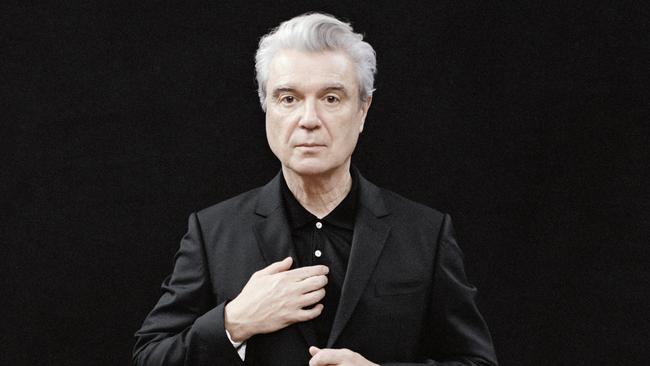David Byrne: Talking Heads frontman doesn’t just deliver the hits
Ahead of an Australian visit next month, American pop singer and songwriter David Byrne explains his ethos.

When you first started writing songs and playing music with an eye to making a living from this art, who were you writing songs and playing music for?
I began playing music when I was in high school, in the Baltimore suburbs. I had no intention of making it a career. I was mostly playing odd covers. It was a hobby; a passionate hobby, I guess one could say.
Even when Talking Heads started rehearsing, and eventually playing, I had no plan except not to adhere to standard existing performance or writing styles.
But I never presumed it could ever be a career; I always was prepared to look for other employment. I was writing for myself, and what I would have wanted to hear, but nobody else was writing that material.
When we began to play to tiny audiences — 20 people, maybe — I realised there might be others out there who feel the same way.
Who do you write songs and play music for now?
I still write what I want to hear, but will admit I have a sense of what is accessible and approachable: songs with hooks, grooves, not excessive length. I want people to listen, rather than doing work that pushes them away. But at the same time I don’t feel a need to pander, as I sense — as before — that there are enough folks who feel like I do.
Which single work of yours did you feel didn’t get the attention it deserved?
My present record [American Utopia], of course! I can’t anticipate what folks will connect with. I myself feel some records are better than others — some songs, too. But that doesn’t always correlate with what becomes popular.
What is your sense of how much your skills have improved — as a songwriter, as a musician, as a performer?
I think I have improved as a performer and writer; I have more arrows in my quiver to draw upon. As a musician, I am OK but no virtuoso.
Are there certain aspects of songwriting or performance that you find more satisfying now than you did as a younger man?
Oh yes, as a younger man I was performing out of desperation. That was the only way I could communicate, as I felt socially awkward and very shy. Gradually, that shyness receded and I became more at ease and the performances — and the songs — expressed more my idea of joy and hope, with a helping of realism as well.
Gradually, over the years, I found my own way to make a show that involves movement, costumes, staging.
Early performances were stripped down to nothing.
Is it easier or harder to find satisfaction in the work itself now?
Making the music and shows is possibly more satisfying than ever. I have more freedom and range. But with the rise of the interweb, everything has a harder time competing with all the noise out there. (Noise is not a quality judgment, by the way.)
We all can more easily make the music we want, but it’s harder than ever to get it heard.
Do you pay attention to what your audience responds well to, and what they tend not to respond to?
I am aware, for example, that Talking Heads fans — who are often an older demographic — will be hoping to hear those songs in a live show, and we play quite a few of them. But I know that if I only play the hits then I quickly become an oldies act, which I refuse to do.
The audiences for this current show are broad and diverse, which I think is a result of me not pandering over the years to what gets the easiest guaranteed response.
I have had my moments of swinging too far the other way, and perversely doing none of the old songs. But now I have figured out how to integrate new and old, so some people can’t tell the difference.
Have you ever felt the lure of purely following what is popular in your own work?
As someone else said, I might follow the factory production methods and tailor my music to tastes and demographics if I knew how, and that it would be guaranteed to work — but I have learned that I can’t predict what will work. So if I tried to please, I would inevitably fail and destroy my cred at the same time. Why risk it?
This email interview has been lightly edited for clarity and length. David Byrne’s American Utopia tour begins in Sydney on November 20, followed by the Gold Coast (November 21), Melbourne (November 24), and concludes in Adelaide (November 25).




To join the conversation, please log in. Don't have an account? Register
Join the conversation, you are commenting as Logout